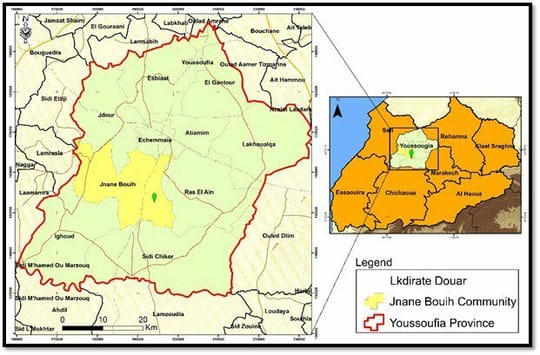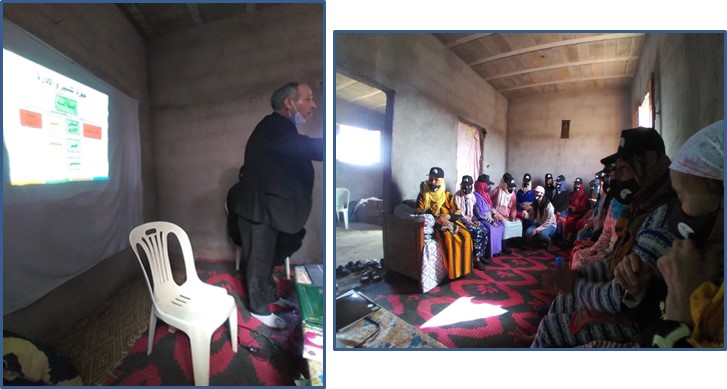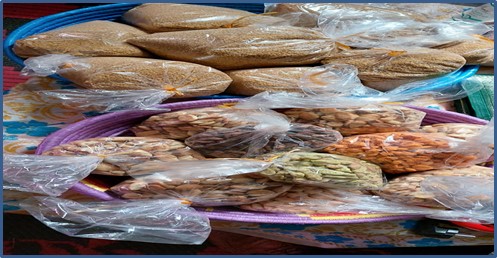The High Atlas Foundation is essential for the advancement of cooperatives

By Youssef Sikou, HAF Volunteer
The basis for the success and rebirth of nations lies in facilitating the means of development as much as possible and preparing the conditions for all who seek success.
In order to activate the territorial activities of the organization affiliated with the High Atlas Foundation (HAF), and in accordance with the directives of the President and Co-Founder, Yossef Ben-Meir, who is keen to carry out such field visits, the Foundation organizes training on the role of cooperatives in the social economy and works to consolidate awareness on the importance of this type of economy in the creation of employment opportunities and efforts to alleviate fragility, exclusion, and marginalization. All this leads to an objective to establish the bases of a new development model under the slogan: “The social and solidarity economy is a lever for building a new development model.”
As an intern at the High Atlas Foundation, I accompanied Ms. Sanae Benaadim, HAF Program Manager, on a field visit to the douar (village) of Lkdirat in the province of Youssoufia, on February 9. During this visit, we went to the nursery established in the community of Jinan Al-Nuwaih to see the progress of the initiatives there.

Geographic location of the douar of Lkdirat. Photo credit: Youssef Sikou
In the village of Lkdirat, we met with the head of the cooperative, who welcomed us warmly, expressing great generosity and kindness. Then, we met Mr. Ahmed Hazel, and together we conducted a training session for the benefit of women of the cooperative, after being briefed on the farm and its facilities.

A tank inside the nursery. Photo credit: Youssef Sikou
In addition, these trainings aim to equip women with the tools necessary to develop and improve their skills related to entrepreneurship, marketing capacities and decision-making as well as to increase productivity and quality. Mr. Ahmed Hazil’s valuable advice and recommendations have sought to push the cooperative to achieve better productivity in a short time using modern technical means. His words focused on the cooperatives’ functioning practices, their general structure, the law that governs them, and some of their long-term and short-term objectives.

Women of Kanouz Lkdirat cooperative receive business training. Photo credit: Youssef Sikou
The great advantages that cooperatives present are undoubtedly in the creation of employment opportunities for nearby communities, their great impact on the promotion of local products in all regions as well as their essential role in the integration of rural women into the social economy.

Products issued by the cooperative. Photo credit: Youssef Sikou
One of the most important points that was discussed and drew great attention was how to strengthen partnership ties between the cooperative and the High Atlas Foundation, and ways to establish other parallel income-generating projects for the cooperative in addition to its partnership with the Foundation. This is evident in some of the other products issued by the cooperative that were shown to us, including handmade checkered rugs, food items like couscous, and some types of sweets.
He then spoke about best practices in money management; that is, how to manage income, expenses, and savings, as well as how to develop methods and mechanisms for efficient financial management of the cooperative, which seem to comply with the requirements of electronic commerce (e-commerce) by optimizing the use of the Internet to market products.
To conclude, it was a pleasant and interesting visit, during which the desired objective to support the role of the social economy in building new development models was achieved, and the hoped-for objective in our hands was made clear.was satisfied with it, and what increased my joy and my gratitude was the trust he placed in me as being responsible for this project We hope to move forward in this great project. High Atlas Foundation is grateful to Germanwatch and the USAID Farmer-to-Farmer Program for their role in this project and their support of the people.